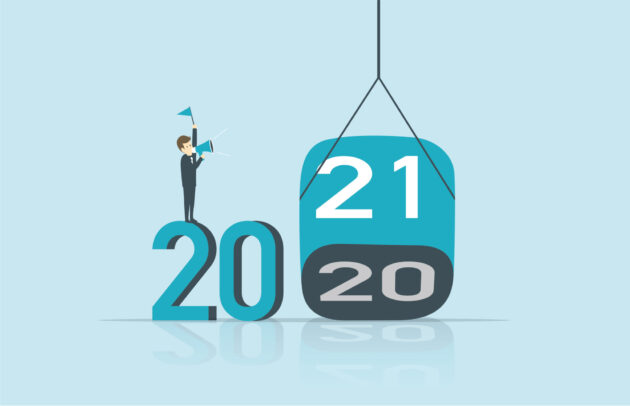With 2020 in the mirror, what does 2021 hold for trucking?
The editors at Webster’s really put a bow on 2020 when they officially added “social distancing,” “rapid testing,” and “asymptomatic” to the dictionary. Voting wasn’t even close when “pandemic” was “honored” as the word of the year.
I’m as ecstatic as you are to see 2020 in the rearview mirror. My fingers are crossed that testing and vaccines will bring us some semblance of normalcy soon.
In an odd way, 2020 was a good year for trucking after the initial shock and fear stemming from last spring’s lockdowns. After working the phones and talking to my in-the-know trucking peeps, here’s what the next 12 months could have in store for the industry.

Economic rebound
The downturn in service businesses like travel and restaurants means that consumers are spending their money on products. That means there’s lots of freight to haul.
Unfortunately, there also are fewer truck drivers than ever before. The pandemic closed driving schools and drove aging workers into the safety of retirement.
With more loads to move and capacity in short supply, carriers should have pricing power as long as there are no more sweeping government-mandated closures and people have money to spend. Expect rates to go up significantly in 2021.
Is Driver Inc. done?
The walls are closing in on the Driver Inc. scam. It’s never been a question if carriers were cheating but when the Canada Revenue Agency was going to start enforcing the tax laws on the books to level the playing field. With Trudeau projected to have Canada’s debt at a whopping $1.4 trillion by the end of the first quarter, we could use the coin!
Surprisingly, help has come at the provincial level. Workers compensation boards are using networks and data to identify misclassified workers. In Ontario the WSIB has made adjustments totaling millions of dollars to be paid by non-compliant carriers. With a new anonymous tip line and an awareness campaign targeting shipper CEOs, the pressure is mounting this year to comply or pay large.
ELDs and MELT
I was surprised when a Today’s Trucking survey found that 37% of Canadian fleets said they are unprepared for the June 12, 2021, electronic logging device deadline.
Running without a third-party-verified ELD means massive long-term collateral damage to your CVOR if you get busted. Speaking with some of the ELD providers, it takes six months at a bare minimum for carriers and drivers to learn a new system of managing logs.
It’s a big cultural shift, especially for drivers who have been using paper logs for years.
Mandatory entry-level training (MELT) is also on the agenda for 2021 and is finally being implemented across all provinces. It’s a great step toward safer highways but I’m still not sure if 113 hours is enough training.
Both ELDs and MELT will also add significant costs to the struggling smaller fleets.
Continued consolidation
According to a survey by the Canadian Federation of Independent Business, only 50% of small and medium-sized transportation businesses believe they would easily survive a second wave of government-mandated closures or restrictions.
No one has a clue what the fallout from Covid-19 will look like. But I do expect it to exacerbate consolidation (or culling) within the Canadian trucking industry. For a lot of small carriers, government subsidies were their only lifeline. Add ELDs and MELT to the balance sheet and unfortunately many won’t make it to see the end of 2021.
Never forget
Personally, I will not forget 2020 anytime soon as I’ve never been prouder to work in trucking. Last spring the entire world shut down over this terrifying disease. But unlike most other professions, we couldn’t run and hide. As an essential service we had to go to work in spite of the unknown danger and the risk to our families.
Thanks to all the folks who work in the Canadian trucking ecosystem for the amazing efforts last year — 2020 should always be remembered as the year the Canadian trucking industry delivered!
Have your say
This is a moderated forum. Comments will no longer be published unless they are accompanied by a first and last name and a verifiable email address. (Today's Trucking will not publish or share the email address.) Profane language and content deemed to be libelous, racist, or threatening in nature will not be published under any circumstances.
hi i am doing a school assinment and i want to study semi laws
I have been saying since before someone coined the term “melt” that it takes years to train a truck driver. It’s four years for an electrician, a plumber or a mechanic. (technician) AS far as I’m concerned a truck driver needs just as much training & experience and should be recognized as a journeyman.
I started driving a truck 52 years ago & I am still in the industry.